
Anarkali is a 1955 Indian Telugu-language historical romance film, written and directed by Vedantam Raghavayya. The film stars Akkineni Nageswara Rao and Anjali Devi. It is based on the legend of the romance between Mughal prince Salim and the eponymous court dancer.

Bhakta Pothana is a 1943 Telugu-language biographical film directed by K. V. Reddy in his directorial debut. Based on the life of poet-saint Pothana who translated Bhagavatham into Telugu language, the film was scripted by Samudrala Sr. The film had celebrated Jubilee runs all over the South India including Mysore state and Kerala. It was remade in 1966, starring V. Nagayya as Pothana.
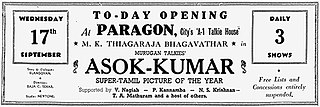
Ashok Kumar is a 1941 Indian Tamil-language historical drama film directed by Raja Chandrasekhar. Based on a legend involving the Mauryan emperor Ashoka The Great, his son Kunala and Ashoka's second wife Thishyarakshai, it stars M. K. Thyagaraja Bhagavathar, Chittoor V. Nagayya and P. Kannamba. The film was released on 17 September 1941.
K. Jamuna Rani is an Indian playback singer who has sung over 6,000 songs in Telugu, Sinhalese, Tamil, Kannada and Malayalam languages.

Tenali Ramakrishna is a 1956 Indian Telugu-language political drama film produced and directed by B. S. Ranga based on Ch. Venkataramaiah's stage play of the same name. Produced for the banner Vikram Productions, it stars Akkineni Nageswara Rao, N. T. Rama Rao, V. Nagayya, Bhanumathi Ramakrishna, and Jamuna in key roles. Ranga handled the cinematography with his brother-in-law B. N. Haridas while P. G. Mohan edited the film. Viswanathan–Ramamoorthy composed the soundtrack and background score.

Gruhalakshmi is a 1938 Indian Telugu-language drama film produced and directed by H. M. Reddy. Starring Ramanujacharyulu, Kanchanamala, Kannamba, and Chittoor Nagayya, it was the debut production of Rohini Pictures and marked the cinematic debut of Chittoor Nagayya. The film was an adaptation of the 1929 stage play Rangoon Rowdy by Somaraju Ramanuja Rao and was a commercial success. Gruhalakshmi is notable for introducing Kanchanamala as Telugu cinema's first "oomph" girl, gaining widespread attention for its daring portrayal of sensuality. The film also marked an early career role for K. V. Reddy, who worked as a cashier for Rohini Pictures before becoming a renowned filmmaker.

Yogi Vemana is a 1947 Telugu-language biographical film produced and directed by K. V. Reddy. The story is based on the life of saint poet Vemana. V. Nagayya played the role of Vemana and also composed music and sang many poems and songs in this film exposing his multifaceted talents.
Naa Illu is a 1953 Indian Telugu-language film produced and directed by V. Nagayya. The story was written by Devulapalli Krishnasastri. The film had two dance sequences and full-length Hindi songs sung by Meena Kapoor. The film was simultaneously shot in Tamil as En Veedu with a different supporting cast and locations.

Sumangali is a 1940 Telugu-language film written, directed and produced by B. N. Reddy. The film stars V. Nagayya, A. S. Giri, Kumari and Malathi. The main concept of the film widow remarriage is inspired by Kandukuri Veeresalingam.
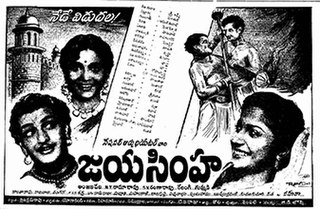
Jayasimha is a 1955 Indian Telugu-language swashbuckler film directed by D. Yoganand and written by Samudrala Jr. It was produced by N. T. Rama Rao and his brother N. Trivikrama Rao for their production company National Art Theatre. The film features Rama Rao playing the eponymous protagonist along with Anjali Devi and Waheeda Rehman in the lead roles, supported by an ensemble cast of S. V. Ranga Rao, Kantha Rao, Gummadi, Relangi and Rajanala Kaleswara Rao.
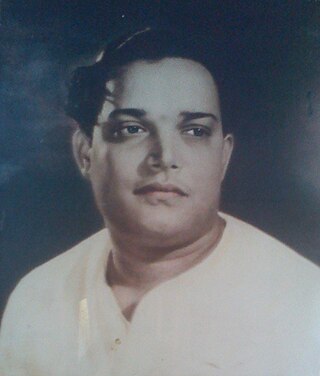
C. R. Subbaraman also known as C. S. Ram (1916–1952) was a famous South Indian film music composer and producer. He was born to Ramasamy at Chintamani village in Thirunelveli, in present-day Tamil Nadu. Music director Shankar of Shankar–Ganesh duo was his younger brother. His ancestors were from the Krishna district of present-day Andhra Pradesh and due to this, his family spoke Telugu well.
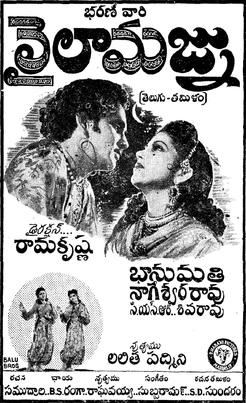
Laila Majnu is a 1949 Telugu-language historical romance film, based on the Sufi legend of Laila-Majnu. It is produced and directed by P. S. Ramakrishna Rao under the Bharani Pictures banner. It stars Akkineni Nageswara Rao and Bhanumathi, with music composed by C. R. Subburaman. The film was simultaneously released in Tamil with same title. The film was successful at the box office.
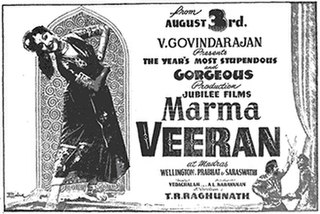
Marma Veeran is a 1956 Indian Tamil-language film written by A. L. Narayanan and directed by T. R. Raghunath and was produced by actor Sriram. The film starred Sriram and Vyjayanthimala with N. T. Rama Rao, Sivaji Ganesan and Gemini Ganesan in guest appearances with Rajasulochana, V. Nagayya, P. S. Veerappa, J. P. Chandrababu, K. A. Thangavelu, M. N. Rajam and T. S. Balaiah forms an ensemble cast. V. Govindarajan of Jubilee Films was the co-producer.

Bahar is a 1951 Hindi Black-and-white social guidance film written and directed by M. V. Raman. It was a remake of the 1949 Tamil film Vazhkai. The film starred Vyjayanthimala and Pandari Bai in their Bollywood debut, Karan Dewan in the lead with Pran, Om Prakash, Leela Mishra, Sunder, Tabassum, Indira Acharya and Chaman Puri, forming an ensemble cast. The film was produced by A. V. Meiyappan with his production company, AVM. The music was composed by S. D. Burman with lyrics provided by Rajendra Krishan, while the editing was done by K. Shankarand and M. V. Raman and the camera was handled by T. Muthuswamy. The story revolves around Lata, Daksh Garg and Malti.

Pillalu Thechina Challani Rajyam is a 1960 Indian Telugu-language film directed by B. R. Panthulu. The film stars Panthulu, M. V. Rajamma, and Valluri Balakrishna. It was simultaneously made in Tamil as Kuzhandhaigal Kanda Kudiyarasu and in Kannada as Makkala Rajya. Narasimharaju and Balakrishna play pivotal roles in the Kannada version while Javar Seetharaman and K. Sarangapani play supportive roles in the Tamil version. This film was partly coloured by Gevacolor and processed at the Film Centre, Mumbai. Umesh made his film debut with this film.

Santhi Nivasam is a 1960 Indian Telugu-language drama film directed by C. S. Rao. The film stars Akkineni Nageswara Rao, Rajasulochana, Kantha Rao, Krishna Kumari and Devika. It is an adaptation of Palagummi Padmaraju's Telugu play of the same name, which itself was based on B. S. Ramiah's Tamil play Malliyam Mangalam.

Soudamini is a 1951 Indian Telugu-language swashbuckler film, produced and directed by K. B. Nagabhushanam, and presented by Kannamba. It stars Akkineni Nageswara Rao, S. Varalakshmi and Kannamba, with music composed by S. V. Venkatraman. The film was a box office hit.

Dharma Devatha is a 1952 Indian film produced and directed by P. Pullaiah. The film stars Santha Kumari and Kaushik, with Mudigonda Lingamurthy, Mukkamala, Relangi, Baby Sachu and Girija in supporting roles. It was simultaneously shot in Tamil and Telugu languages.

Rechukka Pagatichukka is a 1959 Indian Telugu-language swashbuckler film, produced by N. Trivikrama Rao and directed by Kamalakara Kameswara Rao. It stars N. T. Rama Rao, Sowcar Janaki and S. V. Ranga Rao, with music composed by T. V. Raju. The film was simultaneously made in Tamil as Raja Sevai.
Bhagyalakshmi is a 1943 Indian Telugu-language drama film directed by P. Pullayya and produced by Chittoor Nagayya. The film features Chittoor Nagayya, Malathi, Doraswamy, Tanguturi Suryakumari, and Giri in key roles. It is notable for being Nagayya’s first production under the Renuka Films banner. Bhagyalakshmi was recognized as the 100th talkie film in Telugu cinema, as noted in a souvenir published by the Film Federation of India to commemorate the silver jubilee of Indian talkies. It did not perform well at the box office.















